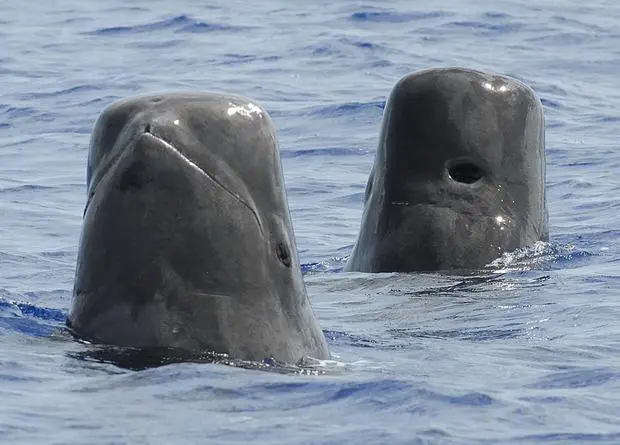The noise of boats powered by combustion engines has a negative effect on female grinds with calves. Zoologists have found that in response to the approach of such a vessel, the mother grind reduces rest time by 29 percent, and the time for feeding her offspring with milk by 81 percent. Such changes can significantly reduce the young dolphin’s chances of survival. In comparison, boats with quieter electric motors do not significantly affect grind behavior. In an article for the journal Scientific Reports, the authors of the study express the hope that their results will be taken into account when organizing observations of whales and dolphins.
Whaling is a thing of the past in most parts of the world. It has been replaced by a new industry: organizing cetacean sightings in the wild. It is believed that the attention of people does not interfere too much with these marine mammals – unless, of course, ships with tourists come too close to them. However, the motors of boats and boats often make a lot of noise, to which whales and dolphins are very sensitive. Thus, even if a gasoline powered cruise ship is at a safe distance from a dolphin or whale, in theory it can still be stressed.
A team of researchers led by Patricia Arranz from the University of La Laguna decided to test this assumption with the example of the short-finned grind (Globicephala macrorhynchus) from an isolated population that inhabits the waters around the island of Tenerife in the Canary archipelago and has about 250 individuals. Since the grinds hang around the island all year round, they are fairly easy to spot. Not surprisingly, Tenerife has a strong industry for observing these large dolphins. In 2018, there were 48 companies here that specialized in this activity. In total, they owned 68 vessels.
In 2020-2021, Arranz and her colleagues conducted a number of field experiments in the waters off the west coast of Tenerife. Having found grind females with cubs resting at the sea surface (they were usually accompanied by a small group of relatives), scientists approached them on a boat equipped with two gasoline or two quieter electric engines. Their volume was up to 150 decibels and up to 140 decibels, respectively.
The authors followed the rules for observing whales and dolphins established in the Canary Islands: they did not swim less than 60 meters to the grinds and did not develop a speed higher than 7.4 kilometers per hour. Having started movement 200 meters from the female with the calf, the boat passed them in an arc at a speed of about three kilometers per hour and stopped, having overcome another 200 meters. At the same time, scientists approached some individuals only 200 meters – they made up a control group. In all cases, the behavior of the grind was recorded on video using a drone for 15 minutes.
In total, Arrans and her co-authors were able to observe 36 mother-and-cubs. Control females rested 83 percent of the time. When the grind mothers were approached in a boat with relatively quiet electric motors, they slightly reduced rest time to 73 percent, and the noise of gasoline engines reduced this value to 59 percent (that is, by 29 percent). Cubs generally took less time to rest than their mothers (54 percent of the time in the control group), and the authors were unable to confirm that this proportion decreased due to engine noise.
The females in the control group fed the pups with milk 27 percent of the time. The passage of a vessel powered by electric propulsion unreliably reduced this share to 16 percent. However, when a petrol-powered boat sailed up to the grinds, the proportion of time devoted to feeding dropped to five percent, 81 percent less than control conditions. At the same time, the presence of the vessel did not affect the proportion of time that the females devoted to diving, as well as the respiration rate of the mother and calf.
Analysis has shown that the noise of a gasoline engine causes anxiety in female grinds, interferes with their rest and significantly reduces the time they spend feeding their cubs. The authors believe that these changes negatively affect the condition of mothers and their offspring: the former spend more energy, and the latter receive less food. Ultimately, this can adversely affect the survival of juvenile dolphins. Similar results were previously obtained for gray dolphins (Grampus griseus) off the Azores and bottlenose dolphins (Tursiops truncatus) in New Zealand, both of which reduced their resting time due to the fault of tourist boats (although noise levels were not assessed in these studies). At the same time, the noise of the electric motor barely affected the behavior of the grinds.
Arranz and her colleagues point out that for the safety of dolphins and whales, it is necessary to limit the noise from tourist vessels to 150 decibels. One way to do this is to switch them to quieter electric motors.
Man-made noise is an increasingly serious problem for ocean dwellers. For example, the noise of motor boats drowns out the love songs of Mediterranean toadfish (Halobatrachus didactylus). As a result, it is more difficult for them to hear potential partners and competitors.
Photo: Short-finned grinds (Globicephala macrorhynchus) / Wikimedia Commons







